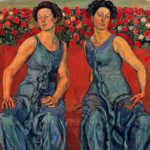We run our website the way we wished the whole internet worked: we provide high quality original content with no ads. We are funded solely by your direct support. Please consider supporting this project.

Women, Leadership, & the Bible
Neither reason nor experience supports the notion that women cannot be gifted to exercise the highest levels of spiritual authority. There is simply no rationally discernable connection between a person’s gender and their natural ability to preach, teach, or lead others. Indeed, the experience of the last 150 years has indisputably demonstrated that women can be used by God as outstanding preachers, teachers, evangelists, and pastors.
To deny that woman have the capacity to exercise spiritual headship—as complementarians argue—presupposes a view of women as essentially inferior to men. A female, by virtue of being female, is deemed to be incapable of carrying out a role that men can carry out. This is not functional subordination but subordination rooted in nature.
Even so, there are specific biblical arguments used against the egalitarian view of women in ministry that we cannot ignore. The first is an observation about the ministry of Jesus and the second deals specifically with Paul’s prohibitive statements that seem to limit women’s roles in the church.
Jesus’ Twelve Disciples. Opponents of the egalitarian view often cite Jesus’ selection of twelve men as evidence that the highest level of spiritual authority belongs to men. In response, Jesus’ choice of twelve men was based on cultural expediency and religious symbolism, not a deficiency in the nature of females. That is, in first century Jewish culture a woman would have found it impossible to gain widespread respect as a spiritual authority. Not only this, but Jesus was reconstituting the “New Israel,” and, as such, would naturally have chosen twelve men to represent the twelve sons of Jacob (viz. the twelve tribes of Israel). Hence, Jesus’ choice says nothing about his views of the inherent capacities of women.
Pauline Prohibitions. The primary objection against the egalitarian position is that Paul explicitly prohibits women from speaking in church (I Cor. 14:34), and from teaching or having authority over men (1 Tim. 2:11-14). Since we have examples of women violating these prohibitions in Scripture (see previous post), we should look for particular cultural reasons why Paul might have made these statements.
Concerning the prohibition from speaking in church, this cannot be taken as absolute for the simple reason that Paul earlier taught that a woman could pray and prophesy in church, so long as they had their head covered (I Cor. 11:5). How do we reconcile these statements? It is significant that immediately after instructing women to keep silent, Paul added, “If there is anything they [women] desire to know, let them ask their husbands at home” (I Cor. 14:36). In certain synagogues of the day, women (who were usually denied an education) would have questions about the message. They would disrupt services by asking their more educated husbands (usually sitting across the aisle, as was the custom) what the teacher meant. It seems likely Paul is addressing a similar problem at Corinth. His instruction has no application in a cultural situation such as our own in which women have the same educational opportunities as men.
Regarding the Timothy passage where woman are prohibited from teaching or leading men, two things need be said. First, the context of this instruction offers clues that it is culturally conditioned. Paul says that women should “dress themselves modestly … not with their hair braided, or with gold, pearls, or expensive clothes …” (I Tim. 2:9). Few today consider these instructions to be timeless commands. Why then do some assume he is speaking timeless truths in the next sentence when he says women should “learn with full submission” (I Tim. 2:11)?
Second, the cultural context in which Timothy was pastoring a new church gives further clues to the culturally conditioned nature of Paul’s prohibition. We know that women had prominent leadership roles in a religious cult that permeated Ephesus. The center of this cult was the Temple of Diana, an enormous structure that was considered one of the Seven Wonders of the World. Part of the religious function of some of these female spiritual leaders was to engage in ritualistic prostitution. In this context, having newly converted pagan women in leadership positions would be unwise and would form a barrier to the furthering of the Gospel. (This is also why Paul restricts the offices of overseers and deacons to men, I Tim. 3:2,4,12.)
But doesn’t Paul base his teaching on the fact that “Adam was formed first, then Eve” as well as on the fact that “Adam was not deceived, but the woman was decieved” (I Tim. 2:14)? On the surface, this instruction is puzzling. What difference does it make that Adam came before Eve? Wouldn’t this same logic require that the animals have authority over humans, since they were created before us? And wasn’t Adam deceived as much as the woman? Indeed, doesn’t Paul elsewhere place the onus of responsibility for the deception on Adam (Rom. 5:12, 17-19)?
The puzzle is removed when we understand Paul’s instruction in the light of a common rabbinic understanding of what happened in the garden. According to this tradition, Adam was at fault for not properly instructing Eve about the dangers and consequences of eating from the forbidden tree. Adam had been created first and had received instruction directly from God. Eve was created second and was dependent on Adam for this information. This is why she was more vulnerable and also why Adam bore the brunt of responsibility for the fall.
If read in this light, Paul’s instruction to Timothy begins to make sense. Paul is appealing to this rabbinic understanding as a rationale for why he is telling Timothy not to allow women in his church to teach. They are in the same position as Eve was, and are therefore vulnerable (cf. I Tim. 5:11-15 where Paul expands upon this vulnerability). This warning would have no application in cultural contexts in which women are afforded as much opportunity to learn as men, and in which there are no negative religious connotations associated with women in leadership.
The passages which prohibit women from teaching and preaching no longer apply because the circumstances have changed. The suspicions that critics have today about women in leadership have nothing to do with the struggles of Ephesus and the impact of fertility cults. And when women today are told that they should be silent in church, it’s not because women are disrupting the service because they don’t understand what’s going on. It is time to stand behind Christian women, affirming and supporting them in their callings and gifts, even in leading and teaching.
Image by Aaron Burden via Unsplash
Category: General
Tags: Bible, Gender Roles, Women In Ministry
Topics: Ethical, Cultural and Political Issues
Verse: 1 Corinthians 14, 1 Timothy 2, 1 Timothy 3
Related Reading

What are Your Thoughts on Feminism? (podcast)
Greg shares his thoughts on the power and potential of women, and reflects on the obstacles women have had to face in the recent history of our society. Episode 495 http://traffic.libsyn.com/askgregboyd/Episode_0495.mp3

When You Doubt the Bible
Kit via Compfight Many people enter into conversations with ReKnew and Greg’s writings because they have questions and doubts about the Bible which they do not feel they can ask within their current church tradition. When they arise, and they will, what do we do with them? How do we process them in a healthy…

Why Bart Ehrman Doesn’t Have to Ruin Your Christmas (Or Your Faith) Part 4
This is the fourth of several videos Greg put together to refute Bart Ehrman’s claims published in the article What Do We Really Know About Jesus? We hope you’re enjoying these! They really provide a great overall approach to Biblical Criticism. If you missed the first three installments you can find them here, here and here.

The Way We Disagree Matters
Rachel Held Evans posted her reflections on the ways we interact over differences in Biblical interpretation. It’s an important topic as we live out the kingdom among one another in our polarizing environment. How do you maintain a Christ-like posture when you are attacked or when others question your devotion to Christ when you express…

Crucifixion of the Warrior God Update
Well, I’m happy to announce that Crucifixion of the Warrior God is now available for pre-order on Amazon! Like many of you, I found that the clearer I got about the non-violent, self-sacrificial, enemy-embracing love of God revealed in Christ, the more disturbed I became over those portraits of God in the Old Testament that…

History and Bible: Do They Align?
To begin, it is significant that when Jesus and the authors of the NT referred to their sacred writings as “God-breathed,” they were referring to the writings that had been handed down to them. So too, the text that the Church has always confessed to be “God-breathed” has been the canon she received. Never has…
